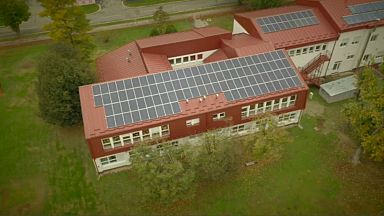A European Union-funded renewable energy project is helping to build bridges in the Balkans – and saving money at the same time.
A European Union-funded renewable energy project is helping to build bridges in the Balkans – and saving money at the same time.
Thanks to the R-Sol-E solar energy initiative, two Croatian towns and a city in Serbia are working together on creating renewable energy.
The energy consumption of public buildings and infrastructure is decreasing, while cooperation between the two countries is increasing.
In all, there are five solar power stations in the Croatian town of Belišće, and one in the neighbouring town of Gorjani, all located on public buildings. They produce 200,000 kilowatts of renewable energy per year.
Zdenko Glasovac, principal of the Maslacak kindergarten, told Euronews: "We have been recording the consumption of electricity and water since January. The bills show that we have made savings in electricity, gas and water.”
The city of Novi Sad in Serbia is participating in the same scheme and the three municipal authorities share data on their energy consumption and savings.
Ljerka Vuckovic, the R-Sol-E project manager for Croatia, said: "Whether it is in the field of renewable energy protection or the environment or maybe enhancing our tourism offerings, there is always common ground.
"And I think that these programmes, which are about cross-border cooperation, are allowing us to find common topics on which we can build bridges. So not to go back, but to look to the future.”
The total budget for the project is just over 1 million euros, of which €858,000 comes from the EU's Cohesion Policy.
The result: an energy saving of more than 60 per cent, which represents a saving of 30,000 euros a year for the three participating authorities.
In Novi Sad, the project has made it possible to upgrade street lighting to make the network more efficient.
The city's energy bill has been reduced by 80 per cent, partly thanks to the streetlights now powered by solar panels.
The project was inspired by what has been done in other European cities such as Gussing and Graz in Austria.
The streetlights are equipped with sensors: they light up as soon as someone approaches and turn off when the person leaves.
Each lamp post also has an identification number. If there are potential problems – such as a blown lamp - the city authorities can be notified online and respond quickly.












